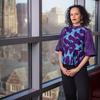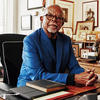Date:
Location:
The Project on Race & Gender in Science & Medicine at the Hutchins Center for African & African American Research is pleased to sponsor a series of webinars on Epidemics and the Effects on the African American Community from 1792 to the Present, hosted by Professor Evelynn Hammonds.
The first webinar, Epidemics and Health Disparities in African American Communities: A Conversation with David Williams will be held on Thursday, April 9, 2020 at 4pmET via Zoom.
REGISTRATION LINK: https://harvard.zoom.us/meeting/register/uZcsfu-vrjgtPVLcppTHMdwO2HAuUOoUsQ
"There are few events in history which afford more striking illustrations of the good and bad qualities of humanity, or which contain more of the 'romance of real life' -- and present more impressive and startling pictures of virtue and vice, of sorrow and suffering, of generosity and selfishness, of true courage and cowardice, of charity and meanness, than the visitation of a destructive pestilence." Comment on the yellow fever epidemic in New Orleans 1853.
 Evelynn M. Hammonds is a member of the faculty in the Faculty of Arts and Sciences at Harvard University. She was the first Senior Vice Provost for Faculty Development and Diversity at Harvard (2005-2008). From 2008-2013 she served as Dean of Harvard College. She holds honorary degrees from Spelman College and Bates College. Professor Hammonds is the director of the Project on Race & Gender in Science & Medicine at the Hutchins Center for African and African American Research at Harvard. Professor Hammonds earned a Ph.D. in the history of science from Harvard University, an S.M. in physics from the Massachusetts Institute of Technology (MIT), a B.E.E. in electrical engineering from the Georgia Institute of Technology, and a B.S. in physics from Spelman College. In 2010 she was appointed to President Barack Obama’s Board of Advisers on Historically Black Colleges and Universities and in 2014 to the President’s Commission on Excellence in Higher Education for African Americans. She has published articles on the history of disease, race and science, African American feminism, African-American women and the epidemic of HIV/AIDS and analyses of gender and race in science and medicine. Professor Hammonds’ current research focuses on diversity in STEM fields; the intersection of scientific, medical and socio-political concepts of race in the United States; and genetics and society. Prof. Hammonds served two terms on the Committee on Equal Opportunity in Science and Engineering (CEOSE), the congressionally mandated oversight committee of the National Science Foundation (NSF). Prof. Hammonds was appointed to the Committee on Women in Science, Engineering and Medicine (CWSEM) of the National Academies in 2017.
Evelynn M. Hammonds is a member of the faculty in the Faculty of Arts and Sciences at Harvard University. She was the first Senior Vice Provost for Faculty Development and Diversity at Harvard (2005-2008). From 2008-2013 she served as Dean of Harvard College. She holds honorary degrees from Spelman College and Bates College. Professor Hammonds is the director of the Project on Race & Gender in Science & Medicine at the Hutchins Center for African and African American Research at Harvard. Professor Hammonds earned a Ph.D. in the history of science from Harvard University, an S.M. in physics from the Massachusetts Institute of Technology (MIT), a B.E.E. in electrical engineering from the Georgia Institute of Technology, and a B.S. in physics from Spelman College. In 2010 she was appointed to President Barack Obama’s Board of Advisers on Historically Black Colleges and Universities and in 2014 to the President’s Commission on Excellence in Higher Education for African Americans. She has published articles on the history of disease, race and science, African American feminism, African-American women and the epidemic of HIV/AIDS and analyses of gender and race in science and medicine. Professor Hammonds’ current research focuses on diversity in STEM fields; the intersection of scientific, medical and socio-political concepts of race in the United States; and genetics and society. Prof. Hammonds served two terms on the Committee on Equal Opportunity in Science and Engineering (CEOSE), the congressionally mandated oversight committee of the National Science Foundation (NSF). Prof. Hammonds was appointed to the Committee on Women in Science, Engineering and Medicine (CWSEM) of the National Academies in 2017.
 David R. Williams is the Florence and Laura Norman Professor of Public Health and Chair, Department of Social and Behavioral Sciences, at the Harvard T.H. Chan School of Public Health. He is also a Professor of African and African American Studies at Harvard University An internationally recognized social scientist, his research has enhanced our understanding of the ways in which socioeconomic status, race, stress, racism, health behavior and religious involvement can affect physical and mental health. He is the author of more than 475 scientific papers and the Everyday Discrimination Scale that he developed is the most widely used measure of discrimination in health studies.
David R. Williams is the Florence and Laura Norman Professor of Public Health and Chair, Department of Social and Behavioral Sciences, at the Harvard T.H. Chan School of Public Health. He is also a Professor of African and African American Studies at Harvard University An internationally recognized social scientist, his research has enhanced our understanding of the ways in which socioeconomic status, race, stress, racism, health behavior and religious involvement can affect physical and mental health. He is the author of more than 475 scientific papers and the Everyday Discrimination Scale that he developed is the most widely used measure of discrimination in health studies.
Dr. Williams is an elected member of the National Academy of Medicine, the American Academy of Arts and Sciences and the National Academy of Sciences. He has played a visible, national leadership role in raising awareness levels of social inequities in health. He served as the staff director of the Robert Wood Johnson Foundation Commission to Build a Healthier America and as a key scientific advisor to the award-winning PBS film series, Unnatural Causes: Is inequality Making Us Sick? His research has been featured in the national print and television media and in his TED Talk.
Zoom Tip: Plan to log in to Zoom 5-10 minutes before the start time to be sure that your computer is set up.






